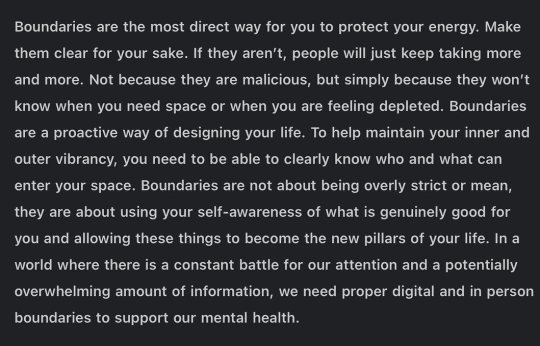#settingboundaries
Text
Removing myself from all situations where I don’t feel loved, supported, appreciated, or respected.
#selflove#selfrespect#standupforyourself#knowyourworth#positivevibesonly#cleanse#detox#cuttingties#settingboundaries#prioritizingme#choosy#intuition#listeningtomyheart#nonnegotiable#dealbreaker#redflag#selfcare#peaceofmind#nontoxic#healthyrelationships#positivepeople#goodenergy#protectyourpeace#honorself#selfpreservation
59 notes
·
View notes
Photo

Boundaries are the most direct way for you to protect your energy. Make them clear for your sake. If they aren’t, people will just keep taking more and more. Not because they are malicious, but simply because they won’t know when you need space or when you are feeling depleted. Boundaries are a proactive way of designing your life. To help maintain your inner and outer vibrancy, you need to be able to clearly know who and what can enter your space. Boundaries are not about being overly strict or mean, they are about using your self-awareness of what is genuinely good for you and allowing these things to become the new pillars of your life. In a world where there is a constant battle for our attention and a potentially overwhelming amount of information, we need proper digital and in person boundaries to support our mental health. — Yung Pueblo #boundaries #settingBoundaries #selfAwareness #mentalHealth #yungPueblo https://www.instagram.com/p/CnKJyjjOGw7/?igshid=NGJjMDIxMWI=
62 notes
·
View notes
Text
setting boundaries.
no longer giving people the space or opportunity to disrespect me, my lifestyle, my partner, my goals, my intelligence, my thoughts, my opinions, my work choice, what i do and how i do things.
14 notes
·
View notes
Text

Have to start somewhere, right?
#boundaries#mentalhealth#mentalhealthmemes#settingboundaries#comedy#joke#funny#memes#humor#memesdaily#lol#jokes#memestagram#funnymemes#relatable#funnymeme#dankmemes#laugh#haha#lmao#laughing#funnyposts#funnypic#memetastic#meme#lol pic#lolpost#lol post#lol memes#help lol
26 notes
·
View notes
Text
Unsaid Words
Words dissolve like sugar on my tongue, although they taste of iron and salt. I swallow them and they burn my throat like an aged wine. They fall into my chest, pressing my lungs like bellows, stroking flames in my heart. Their ghosts strike desperately against my ribcage, sending vibrations through my bones.
Eventually they will grow tired and quiet, and I will forget their revolt. But when the sugar inevitably sours again, they will beg me to lay them to rest once more. Perhaps next time I will let fire pass through my lips, but for the moment I bite my tongue.
4 notes
·
View notes
Text
Get Out of Toxic Relationships Ending Harmful Connections

Get Out of Toxic Relationships: A Guide to Recognizing and Ending Harmful Connections
If you're in a toxic relationship, it can be challenging to know how to get out. Toxic relationships can be emotionally and physically draining, and it can be difficult to know where to turn or who to talk to. However, it's important to remember that you deserve to be in a healthy and supportive relationship, and there are steps you can take to leave toxic relationships behind.
Recognizing the signs of a toxic relationship is the first step to getting out. These signs can include verbal or physical abuse, controlling behavior, manipulation, and disrespect. If you feel like you're walking on eggshells around your partner, or if you're constantly questioning your own worth or value, it may be time to take a step back and evaluate the relationship.
Once you've recognized the signs of a toxic relationship, it's important to create a plan for leaving. This may involve seeking support from friends or family members, reaching out to a therapist or counselor, or finding resources in your community that can help you safely leave the relationship. Remember, leaving toxic relationships can be a difficult and emotional process, but it's important to prioritize your own safety and well-being.

Understanding Toxic Relationships
Toxic relationships can be harmful to your mental and physical well-being. It is important to recognize the signs of a toxic relationship and take steps to get out of it. In this section, we will discuss how to identify toxicity in a relationship and the effects it can have on your mental health.
Identifying Toxicity
Toxic relationships can take many forms, and it is not always easy to identify them. Here are some signs that may indicate that you are in a toxic relationship:
- You feel drained after spending time with your partner
- Your partner is controlling and manipulative
- Your partner is verbally or physically abusive
- Your partner is constantly criticizing you or putting you down
- Your partner is jealous or possessive
- Your partner is always blaming you for their problems
If you recognize any of these signs in your relationship, it is important to take action to protect yourself.
Effects on Mental Health
Toxic relationships can have a significant impact on your mental health. Here are some of the effects that toxic relationships can have:
- Anxiety and depression
- Low self-esteem
- Difficulty trusting others
- Isolation from friends and family
- Feeling trapped and helpless
- Physical symptoms such as headaches and stomach problems
It is important to seek help if you are experiencing any of these symptoms. A therapist or counselor can help you work through the effects of a toxic relationship and develop strategies for moving forward.
Remember, you deserve to be in a healthy and supportive relationship. If you are in a toxic relationship, it is never too late to get out and start taking steps towards a happier and healthier future.
Recognizing Your Worth
Recognizing your worth is the first step to getting out of toxic relationships. It's not always easy to see your own value when you're in a relationship that makes you feel small or unimportant. However, it's important to remember that you are a valuable person with unique qualities and strengths.
Here are some tips to help you recognize your worth:
- Identify your strengths: Make a list of your strengths, talents, and accomplishments. Focus on what you do well and what makes you proud. This will help you see yourself in a more positive light.
- Practice self-care: Take care of yourself physically, mentally, and emotionally. This can include things like exercise, healthy eating, meditation, and therapy. When you take care of yourself, you send a message to yourself and others that you are important.
- Set boundaries: Boundaries are essential in any healthy relationship. They allow you to protect your time, energy, and emotions. If someone is crossing your boundaries, it's important to speak up and let them know.
- Surround yourself with positive people: Spend time with people who lift you up and make you feel good about yourself. This can be friends, family, or even a support group. Being around positive people can help you see your own worth more clearly.
Remember, recognizing your worth is a process that takes time and effort. It's not something that happens overnight, but it's worth the effort. When you recognize your worth, you'll be better equipped to leave a toxic relationship and build a healthier, happier life for yourself.

Setting Boundaries
When it comes to getting out of toxic relationships, setting boundaries is a crucial step. Boundaries are limits that you set for yourself and others to protect your physical, emotional, and mental well-being. Here are some ways to set boundaries effectively:
Communicating Effectively
Communication is key when it comes to setting boundaries. It's important to be clear, direct, and assertive when communicating your boundaries. Here are some tips for effective communication:
- Use "I" statements to express how you feel. For example, "I feel uncomfortable when you raise your voice at me."
- Be specific about what behaviors are not acceptable. For example, "It's not okay for you to call me names."
- Avoid blaming or attacking the other person. Instead, focus on your own feelings and needs.
- Listen to the other person's perspective, but don't let them invalidate your boundaries.
Learning to Say No
Learning to say no is another important aspect of setting boundaries. It can be difficult to say no, especially if you're used to putting other people's needs before your own. Here are some tips for saying no:
- Be firm and direct. You don't have to apologize or give a lengthy explanation.
- Use "I" statements to express your needs. For example, "I can't do that for you right now because I need to take care of myself."
- Remember that saying no is not selfish. It's important to prioritize your own well-being.
- Practice saying no in low-stakes situations, like turning down a social invitation, to build your confidence.
By setting boundaries and communicating effectively, you can protect yourself from toxic relationships and create healthier relationships with others. Remember that setting boundaries is a process, and it may take time to get comfortable with it. Be patient with yourself, and don't be afraid to seek support from friends, family, or a therapist.
Seeking Professional Help
Seeking professional help is highly recommended for those who are coping with the aftermath of a toxic relationship. It's important to recognize that leaving a toxic relationship can be challenging and may cause emotional distress. A mental health professional can provide guidance and support during this difficult time.
A certified mental health counselor can help you plan your exit strategy and provide you with tools and resources to help you recover from toxic relationships. They can also help you identify any patterns or behaviors that may have contributed to the toxic relationship and work with you to develop healthy coping mechanisms.
In addition to seeking individual counseling, there are also support groups available for those who have left toxic relationships. These groups can provide a safe and supportive environment where you can share your experiences and connect with others who have been through similar situations.
It's important to remember that seeking professional help is not a sign of weakness. Rather, it's a brave and proactive step towards healing and moving forward from a toxic relationship.
Developing a Support Network
When you're trying to get out of a toxic relationship, having a strong support network can make all the difference. This network can include friends, family members, therapists, support groups, and anyone else who can provide you with emotional support and guidance.
Here are some tips for developing a support network:
Identify Your Peeps
The first step in building a support network is to identify the people in your life who are supportive and nurturing. These might be close friends, family members, or even co-workers. Make a list of these people and think about how they might be able to help you.
Cultivate Your Network
Once you've identified the people in your life who can provide you with support, it's important to cultivate those relationships. Reach out to these people regularly, and let them know that you appreciate their support. Make time for them, and be there for them when they need you.
Join a Support Group
Support groups can be a great way to connect with others who are going through similar experiences. Look for support groups in your area, or consider joining an online support group. These groups can provide you with a sense of community and belonging, and can help you feel less alone.
Consider Therapy
Therapy can be a powerful tool for healing from a toxic relationship. A therapist can provide you with a safe space to process your emotions, and can help you develop healthy coping mechanisms. Look for a therapist who specializes in trauma or relationship issues.
Practice Self-Care
Finally, it's important to practice self-care as you're building your support network. Take time for yourself, and do things that make you feel good. This might include exercise, meditation, or spending time in nature. By taking care of yourself, you'll be better able to support others and navigate the challenges of leaving a toxic relationship.
Moving On
Moving on from a toxic relationship can be a challenging process, but it is essential for your mental and emotional well-being. Here are some steps you can take to help you move on:
Healing Process
The first step in moving on from a toxic relationship is to allow yourself time to heal. It's normal to feel a range of emotions, including sadness, anger, and confusion. Acknowledge your feelings, and give yourself permission to grieve the loss of the relationship.
Here are some ways you can facilitate the healing process:
- Seek support from friends, family, or a therapist.
- Practice self-care by doing things that make you feel good, such as exercising, meditating, or taking a relaxing bath.
- Write in a journal to help process your emotions and gain clarity.
- Avoid contact with your ex-partner as much as possible to give yourself space and time to heal.
Remember, healing is a process, and it takes time. Be patient with yourself and trust that you will get through this.
Building Healthy Relationships
Once you have given yourself time to heal, you may be ready to start building healthy relationships. Here are some tips to help you create healthy relationships:
- Set boundaries: Be clear about what you want and need in a relationship, and communicate your boundaries clearly.
- Practice effective communication: Be open and honest with your partner, and listen actively to what they have to say.
- Look for red flags: Be aware of warning signs of toxic relationships, such as controlling behavior, manipulation, and lack of respect.
- Take it slow: Don't rush into a new relationship. Take the time to get to know the person and build a strong foundation of trust and respect.
Remember, you deserve to be in a healthy, loving relationship. By taking the time to heal and build healthy relationships, you can create a fulfilling and happy life for yourself.

Conclusion
In conclusion, leaving toxic relationships is never easy, but it is essential for your mental and emotional well-being. You deserve to be in a healthy and supportive relationship, and it is not your responsibility to fix or change someone else's toxic behavior.
Remember that you are not alone in this process. Seek support from friends, family, or a therapist who can provide a safe and non-judgmental space for you to process your emotions and make a plan for moving forward.
When ending toxic relationships, it is important to prioritize your safety. If you feel unsafe or fear for your physical well-being, consider reaching out to a domestic violence hotline or seeking legal assistance.
Take the time to reflect on what you have learned from this experience and how you can use it to grow and improve in future relationships. Set boundaries and communicate your needs clearly with future partners. Remember that you deserve to be treated with respect and kindness.
Finally, be patient and kind with yourself. Healing from the aftermath of toxic relationships takes time and is a process. Celebrate your progress and give yourself grace as you continue to move forward towards a healthier and happier future.
Read the full article
#buildinghealthyrelationships#effectivecommunication#endingharmfulconnections#mentalhealtheffects#prioritizesafety#recognizingsigns#seekingsupport#self-carepractices#settingboundaries#toxicrelationships
0 notes
Text
Setting Healthy Boundaries: A Comprehensive Guide to Personal Growth and Wellbeing
In today's fast-paced world, setting boundaries is crucial for maintaining mental health and fostering healthy relationships. This article delves into the realm of boundary-setting through the lens of 15 carefully selected books that offer valuable insights and practical strategies. From renowned authors like Dr. Henry Cloud to emerging voices like Nedra Glover Tawwab, these books cover a wide array of topics related to boundaries, self-care, and personal development.
0 notes
Text
Matthew Danchak Advice on Setting Boundaries for Improved Mental Well-being
Setting boundaries is an essential part of maintaining good mental health. Matthew Danchak, a respected mental health advocate, offers valuable advice on how to set boundaries effectively to improve your mental well-being.
#mentalhealthawareness#settingboundaries#selfcare#mindfulness#selflove#selfrespect#MatthewDanchak#healthyliving#personalrowth
0 notes
Text

Finding a balance between work and personal life is crucial for our well-being. Here are some tips for setting healthy boundaries at work:
- Learn to say "no" when your plate is full.
- Prioritise self-care and personal time.
- Communicate your needs clearly.
- Take breaks to recharge and avoid burnout.
- Delegate tasks and seek support when necessary.
By taking care of yourself, you'll be better equipped to excel in your role and contribute positively to your workplace.
#worklifebalance#healthyboundaries#settinghealthyboundaries#settingboundaries#emotionalwellbeing#selfcare#teenhelporg#teenhelp
1 note
·
View note
Link
The Power of Setting Boundaries: Declining Extra Work and Commitments as a Remote Working Parent
0 notes
Text
Setting Healthy Boundaries: Tips for Maintaining Good Health
The Importance of Setting Healthy Boundaries
Hello all, my days have been busy, to say the least. Between work and house chores, my publishing business takes up any free time I have left. Whereas, I’m in the process of writing a non-fiction manuscript about identifying and healing from toxic relationships with a focus on intergenerational trauma. It will cover how to spot a narcissist, what…

View On WordPress
0 notes
Text
I became unreachable to those who had all access & abused it.
#settingboundaries#knowyourworth#selfrespect#selflove#selfcare#movingon#lettinggo#toxicrelationships#abuse#gaslighting#unreachable#inaccessible#closedoff#reserved#detached#distant#isolation#solitude#peaceofmind#learninglesson#nousersfee#limitedaccess#restrictedaccess#selfpreservation
13 notes
·
View notes
Text
Boundary Battles: The Tough Truth About Protecting Your Mental Space!
Explore the #challenges of setting #boundaries later in #relationships and their impact on #mental health. Learn to protect your #emotional space and stay #resilient against resistance.
Setting Boundaries: Navigating the Challenges and Standing Your Ground
In my psychotherapy practice and personal life, I’ve observed the complexities of setting boundaries, especially when they’re established later in relationships. Recently, I had to assert my boundaries with someone close, a decision that was long overdue. This experience highlighted several key aspects of boundary-setting,…

View On WordPress
#Assertiveness#BoundarySetting#EmotionalHealth#EmotionalWellbeing#HealthyBoundaries#HealthyRelationships#MentalHealthAwareness#MentalHealthMatters#MentalStrength#MindBodySoul#Mindfulness#PersonalGrowth#ProtectYourPeace#Psychology#Resilience#SelfCare#SelfLove#SettingBoundaries#TherapyTalks#WellnessJourney
0 notes
Text
Love Limbo: I Don't Want a Relationship But I Like Him
Do you need clarification on confusing signals and non-commitment? I don't want a relationship but I like him. This guide reveals the secrets of Love Limbo! Learn emotional self-care, how to set boundaries, achieve fulfillment outside of relationships, and navigate your path confidently.
#DatingTips#SelfLove#LoveLimbo#Relationships#DatingDilemmas#relationshipgoals#EmotionalWellness#SettingBoundaries#PersonalGrowth#NonCommittalAffection#MixedSignals#SelfUnderstanding#relationshipadvice#datingadvice#healthyrelationships
0 notes
